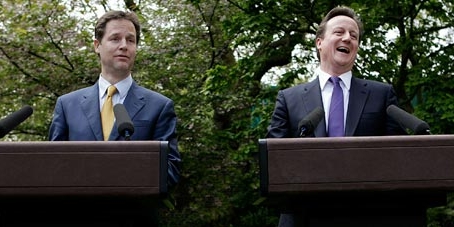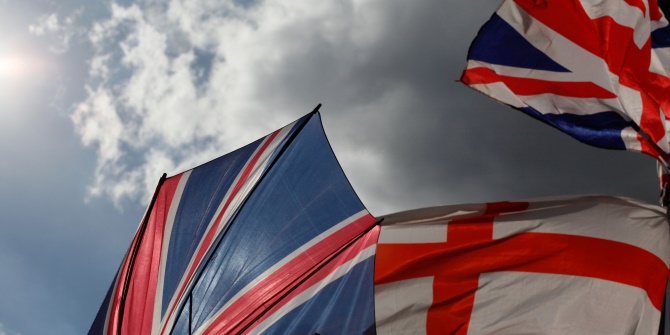 Throughout the short campaign, this blog has been publishing a series of posts that focus on each of the electoral regions in the UK. In this post, Andrew Russell discusses the key things to look out for in the North West.
Throughout the short campaign, this blog has been publishing a series of posts that focus on each of the electoral regions in the UK. In this post, Andrew Russell discusses the key things to look out for in the North West.
North West England is an important battleground for the 2015 general election. Of the region’s 72 Westminster seats, 26 of them could be called marginal and some seats are ultra marginal. All four largest parties have developed distinct regional strategies to campaign locally and in the North West the ground war could be vital; candidates have to ensure that they campaign to encourage every last supporter to vote.
The North West is generally Labour territory and in many of the region’s urban areas Labour’s grip has tightened with the downturn in Liberal Democrat fortunes. In Merseyside, Manchester and much of Lancashire the Labour vote might as well be weighed as counted. Indeed, the only unknown in many seats involves turnout rather than the victorious party. Over the past two decades two North West constituencies have become associated with low levels of voter turnout: Liverpool Riverside experienced the ‘worst’ turn-out in the 1997, 2001 and 2005 elections but this mantle passed to Manchester Central in 2010 where fewer than 50 per cent of the registered electors actually voted. The 18 per cent turn-out in the 2012 by-election represented the lowest level of engagement in a British parliamentary election history. Manchester Central is very unlikely to change hands, but get-out-the-vote campaigns might focus on increasing turnout in the constituency.
The Conservative-Labour Battleground
North West England is a key battleground in the Conservative-Labour war for supremacy, and it is the competition between the two main parties that will characterise most of the region’s election.
It’s hard to see the Conservatives making much progress from the 2010 performance. Bolton West ought to be the Conservatives’ top target after they failed in 2010 by a whisker (92 votes) but in reality the regional focus will be on the seats that the Conservatives can hold rather than those they can win.
The North West does have some of the country’s truest-bluest seats. Chancellor George Osborne won’t be troubled in Tatton and the Conservative safe seat of Eddisbury should survive the retirement of sitting MP Stephen O’Brien. With seats like Macclesfield, Congleton and even the once Labour stronghold Crewe and Nantwich, looking secure, Cheshire should be fertile ground for the Tories, although they are vulnerable to Labour in the City of Chester (Conservative majority 5.5 per cent) and especially Weaver Vale (majority 2.3 per cent).
Instead the focal point for Tory fortunes is likely to be in Lancashire, Merseyside and Greater Manchester. High profile incumbents like Paul Maynard (Blackpool North & Cleveleys – majority 5.3 per cent), Esther McVey (Wirrall West – 6.2 per cent) and David Nuttall (Bury North – 5 per cent) will hope personal votes and public support for the Conservative vision of the northern powerhouse will be sufficient to retain seats won in 2010.
Rossendale and Darwen (majority 9.5 per cent) is interesting, as the swing needed by Labour there is the same as that for an outright majority nationally. However, the two big parties will fight most intensively on the Lancashire coast. Last time, the Conservatives won in Lancaster and Fleetwood by 333 votes, in Morecambe and Lunesdale the Tory victory margin was 866. Labour have campaigned hard and are hopeful of winning both seats back.
Liberal Democrats fighting on two fronts
In the North West, the Lib Dems had established a bridgehead of support at the local, European and Westminster levels by competing with the Labour party for some left-of-centre votes. Nowhere was this more evident than in Manchester Withington in 2005 where a mixture of dissatisfaction with national (Iraq and civil liberties) and local (failure to extend the tramline) Labour policy combined to hand an unexpected victory to the Lib Dems’ John Leech. Although Leech extended his majority in 2010, any realistic hope of further retention was cut short by the coalition agreement. The Lib Dems have been wiped out in Manchester at the local level, and despite Leech voting against many coalition policies (including the tuition-fee hike) it would be a major surprise if Labour did not win back Withington easily. The other Lib Dem-Lab fight is Burnley where Labour, buoyed by strong local performances, are hopeful of unseating Gordon Birtwhistle.
The Lib Dems’ other four seats in the region see the party in direct competition with the Conservatives and here their chances of success seem greater. John Pugh will be confident of holding off the Conservatives in Southport again (the party has held the seat since 1997). Safest of all seems to be Tim Farron, routinely tipped as a future party leader, whose team seem to have turned Westmorland and Lonsdale, a Tory seat as late as 2005 into that rarest of commodities – a Lib Dem fiefdom. Certainly the local party has been immune to the haemorrhage of support that the Liberal Democrats have suffered almost everywhere else. Less secure however are two Lib Dem seats in Greater Manchester: Cheadle would seem to be the most vulnerable to Conservative recovery (6.2 per cent majority) but the retirement of Andrew Stunnell in neighbouring Hazel Grove (15.2 per cent majority) might considerably dilute the advantage Lib Dems derive from incumbency and give extra encouragement to the Conservatives.
UKIP: aiming for crediblity?
UKIP came within 700 votes of causing a real upset in the Heywood and Middleton by-election in October 2014, forcing a recount before Liz McInnes could be declared the victor in a contest that should have been a walkover for Labour. In one fell swoop UKIP demonstrated firstly that they could damage Labour’s heartlands and secondly that UKIP support was capable of flying underneath the radar of even constituency-based polls. UKIP will be hoping for a repeat in May but in truth they might find it harder in a national contest than a local one. Nevertheless a strong second place would underpin UKIP’s claims to be the effective opposition to Labour in seats throughout North West England. As if to make the point, UKIP’s other regional ‘target’ is Labour’s safest seat – Bootle – which demonstrates that UKIP’s regional ambitions might be to establish building blocks for future elections in the North West.
There won’t be huge changes to the North West at the 2015 election, but there are some intriguing examinations for all the parties. The Conservatives will try to hold onto what they have; Labour’s core-vote strategy will be severely tested in its heartlands; UKIP’s aim to put markers down for future elections; and the Lib Dem’s regional dilemma fighting both Labour and the Conservatives is a microcosm of their vulnerability nationally. Nevertheless, change in the region could signal change nationally and the party that emerges victorious in the competitive battleground seats is likely to have the upper hand in the country too.
Note: This article gives the views of the author, and not the position of the General Election blog, nor of the London School of Economics. Please read our comments policy before posting.
 Andrew Russell is Professor and Head of Politics at the University of Manchester. He is a seasoned commentator on British elections and is working for BBC Radio5 Live, BBC Radio Manchester and ITV Granada on election results programmes. His twitter handle is @poliblogmanc
Andrew Russell is Professor and Head of Politics at the University of Manchester. He is a seasoned commentator on British elections and is working for BBC Radio5 Live, BBC Radio Manchester and ITV Granada on election results programmes. His twitter handle is @poliblogmanc







